rotten > Library > Culture > The Simpsons
The Simpsons
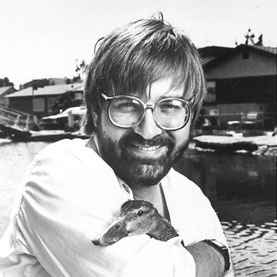 Mmmmmm... Mainstream success....
Mmmmmm... Mainstream success....
Matt Groening (rhymes with "complaining") had made a name for himself as a demented cult cartoonist long before "The Simpsons" ever came along. "Life in Hell," an alternative weekly comic strip, debuted in 1977 with the adventures of a dissipated rabbit named Binky, and his extremely neurotic friends (included fez-wearing gay twins/lovers Akbar and Jeff).
"Life in Hell" was often searingly satirical, pushing the edge with biting comments on relationships, sex, careers and politics. Funny and off the beaten track, the strip caught the attention of the producers of "The Tracey Ullman Show," a headline attraction on the brand-spankin' new Fox TV network.
The original "Simpsons" cartoons were short vignettes inserted around the commercial breaks of the comedy-variety show. These were short punchline-driven segments, with a cynical tone that flowed directly off the pages of "Life in Hell." The animation was terrible, the voices were weird, and the skits tended to have very low energy levels. But they were funny, and they were edgy, qualities that hadn't been seen in TV animation since the glory days of "Rocky and Bullwinkle."
The reactions to the Simpsons bits on "Ullman" were so favorable that Fox picked up the idea as a series of its own, and "The Simpsons" debuted in midseason, January of 1990.
The half hour series instantly became one of the Fox network's biggest hits, scoring an Emmy its first year out.
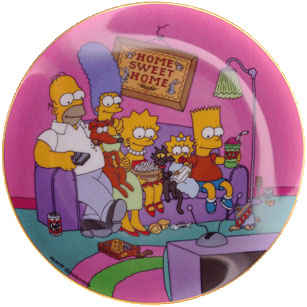 Although it's kind of hard to imagine now, the show was a lightning rod for cultural critics at the time (including Dan Quayle and George and Barbara Bush), who found "The Simpsons" emblematic of everything that was wrong with America, such as Homer's penchant for strangling his trouble-making son, Bart.
Although it's kind of hard to imagine now, the show was a lightning rod for cultural critics at the time (including Dan Quayle and George and Barbara Bush), who found "The Simpsons" emblematic of everything that was wrong with America, such as Homer's penchant for strangling his trouble-making son, Bart.
Of course, the whole point of the show was to be emblematic of everything wrong with America. Arguably, it was the whole point of the entire Fox network. Fortunately for Fox and Groening, Americans love to glorify their faults.
Well, that and the fact that it was really, really, really funny.
The show originally focused on the antics of Bart, the young anti-authoritarian son of the family. After a brief, faddish craze over Bart Simpson catchphrases like "Don't have a cow" and "Eat my shorts," the writers wisely realized that the heart of the show wasn't Bart so much as Homer Simpson, the crude, stupid, selfish patriarch of the family.
In the early going, Homer was basically a brutish and bad father and husband of moderately low intelligence, who learned valuable lessons about caring and sharing when the show bothered to focus on him. But over the course of the first three Simpsons, people began to notice that Homer was also funny. Really funny.
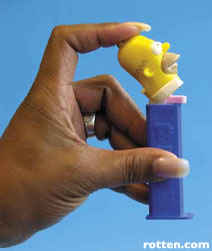 The character progressed from brutish to mind-bogglingly stupid, with a feckless optimism that every awesomely bad idea he came up with would be his ticket "out of this hellhole." It took a couple of years for actor Dan Castellenata to get the voice performance for Homer just right. Once his familiar cadence set in, the show entered its second, non-faddish phase of popularity, and stayed there for a decade.
The character progressed from brutish to mind-bogglingly stupid, with a feckless optimism that every awesomely bad idea he came up with would be his ticket "out of this hellhole." It took a couple of years for actor Dan Castellenata to get the voice performance for Homer just right. Once his familiar cadence set in, the show entered its second, non-faddish phase of popularity, and stayed there for a decade.
Homer's catchphrases had more staying power. There's not a lot of poetry in "Don't have a cow, man" but "Mmmmmmmmm... donuts" satisfied some primal need among viewers. And then there was Homer's anguished cry of existential despair, "D'oh!" Long after Bart's "cowabunga" was gathering dust in the Secret Graveyard of Abandoned Pop Culture Cliches, "D'oh!" received the special distinction of being included in the Oxford English Dictionary in 2001. (It's defined as "expressing frustration at the realization that things have turned out badly or not as planned or that one has just said or done something foolish.")
Rounding out the Simpson clan are Marge, the long-suffering and mostly repressed mother, Lisa, the brainy child, and Maggie, the mute baby.
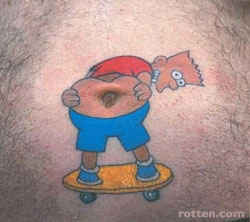 The show succeeds in part because of its ensemble-style cast of misfits, including the dottering Grampa Simpson, incompetent Police Chief Wiggum, uber-nerd Millhouse, Bible-thumping Ned Flanders, evil tycoon Montogmery Burns, ambiguously gay Mr. Smithers, mocking bully Nelson, corrupt Kennedyesque Mayor Quimby, vile bartender Moe, homicidal maniac Sideshow Bob, mommy's boy Principal Seymour Skinner, and the chain-smoking, gambling-addicted, hard-partying children's TV hero, Krusty the Clown.
The show succeeds in part because of its ensemble-style cast of misfits, including the dottering Grampa Simpson, incompetent Police Chief Wiggum, uber-nerd Millhouse, Bible-thumping Ned Flanders, evil tycoon Montogmery Burns, ambiguously gay Mr. Smithers, mocking bully Nelson, corrupt Kennedyesque Mayor Quimby, vile bartender Moe, homicidal maniac Sideshow Bob, mommy's boy Principal Seymour Skinner, and the chain-smoking, gambling-addicted, hard-partying children's TV hero, Krusty the Clown.
As the show went on, the supporting cast was often featured in star turns, including washed-up movie star Troy McClure, portrayed by the late Phil Hartman, who introduced himself invariably with the line: "Hi, I'm Troy McClure! You may remember me from such..."
- ...TV spinoffs as "Son of Sanford and Son" and "After Mannix!"
-
...self-help videos as "Smoke Yourself Thin" and "Get Confident, Stupid"!
-
...such nature films as 'Earwigs: Ewwww' and 'Man vs. Nature: The Road to Victory'."
-
...such films as "The Erotic Adventures of Hercules" and "Dial 'M' for Murderousness"!
-
...from such educational films as "Lead Paint: Delicious but Deadly" and "Here Comes the Metric System!"
After 15 seasons on the air, "The Simpsons" is the longest-running animated series in history, and one of the longest-running series, period. It's tempting at this point to launch a recitation of favorite moments and quotes, such as the parody of The Prisoner, or the Stonecutters episode, or classic Homer lines like "This is everybody's fault but mine!" and "I'll make the money by selling one of my livers," but with something like 350 episodes over 15 years, the list gets a bit unwieldy.
Oh hell, let's do the Homer lines anyway:
- Operator, give me the number for nine-one-one!
-
It's like David and Goliath, only this time David won!
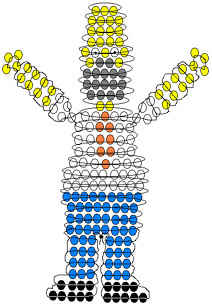
-
Hey, just because I don't care doesn't mean I don't understand!
-
Marge, it takes two to lie. One to lie and one to listen.
-
Marge, I'm going to miss you so much. And it's not just the sex. It's also the food preparation.
-
In this house, we obey the laws of thermodynamics!
-
You don't win friends with salad.
-
You can't keep blaming yourself. Just blame yourself once, and move on.
-
Trying is the first step towards failure.
-
They have the Internet on computers now?
-
Okay, brain. You don't like me, and I don't like you, but let's get through this thing and then I can continue killing you with beer.
-
Kids, you tried your best and you failed miserably. The lesson is, never try.
-
Bart, with $10,000, we'd be millionaires! We could buy all kinds of useful things like...love!
-
Facts are meaningless. You could use facts to prove anything that's even remotely true!
-
Do I know what rhetorical means?
Timeline
| 15 Feb 1954 |
Matt Groening born, Beaverton OR. |
| 1977 |
Life in Hell. |
| 14 Jan 1990 |
Debut of The Simpsons on Fox. |
| 19 Sep 1991 |
Simpsons episode 7F24 "Stark Raving Dad": Michael Jackson guest stars as an obese, caucasian mental patient who thinks he is Michael Jackson. Credited as John Jay Smith. |
| 20 Feb 1992 |
Darryl Strawberry guest stars in Simpsons episode 8F13 of The Simpsons, Homer at the Bat, where he and several other major-leaguers are hired by Mr. Burns to help defeat Shelbyville. |
| 19 Feb 1995 |
Simpsons episode 2F13 airs, Bart vs. Australia. |
| 3 Nov 1996 |
Simpsons episode 3F23 "You Only Move Twice": Supervillain Hank Scorpio asks: "Homer, what's your least favorite country: Italy or France?" When Homer says France, Hank replies: "Nobody ever says Italy." |
| 16 May 1999 |
Simpsons episode AABF20 "Thirty Minutes over Tokyo": Money management guru Chuck Garabedian explains that he got his suit cheap "because Roy Cohn died in it." |
| 28 May 1998 |
Phil Hartman killed by his wife in a murder/suicide. |
| 19 Dec 1999 |
Simpsons episode BABF07 "Grift of the Magi": Gary Coleman guest stars as a security guard working at the secret headquarters of Kid First Industries. |
| 2 Nov 2003 |
Simpsons episode EABF21 "Treehouse of Horror XIV": Jerry Lewis plays the voice of Professor John Frink Sr., a reanimated corpse who has won the Nobel Prize. |
Pornopolis |
Rotten |
Faces of Death |
Famous Nudes
|
 Mmmmmm... Mainstream success....
Mmmmmm... Mainstream success.... Although it's kind of hard to imagine now, the show was a lightning rod for cultural critics at the time (including
Although it's kind of hard to imagine now, the show was a lightning rod for cultural critics at the time (including  The character progressed from brutish to mind-bogglingly stupid, with a feckless optimism that every awesomely bad idea he came up with would be his ticket "out of this hellhole." It took a couple of years for actor Dan Castellenata to get the voice performance for Homer just right. Once his familiar cadence set in, the show entered its second, non-faddish phase of popularity, and stayed there for a decade.
The character progressed from brutish to mind-bogglingly stupid, with a feckless optimism that every awesomely bad idea he came up with would be his ticket "out of this hellhole." It took a couple of years for actor Dan Castellenata to get the voice performance for Homer just right. Once his familiar cadence set in, the show entered its second, non-faddish phase of popularity, and stayed there for a decade.  The show succeeds in part because of its ensemble-style cast of misfits, including the dottering Grampa Simpson, incompetent Police Chief Wiggum, uber-nerd Millhouse, Bible-thumping Ned Flanders, evil tycoon Montogmery Burns, ambiguously gay Mr. Smithers, mocking bully Nelson, corrupt Kennedyesque Mayor Quimby, vile bartender Moe, homicidal maniac Sideshow Bob, mommy's boy Principal Seymour Skinner, and the chain-smoking, gambling-addicted, hard-partying children's TV hero, Krusty the Clown.
The show succeeds in part because of its ensemble-style cast of misfits, including the dottering Grampa Simpson, incompetent Police Chief Wiggum, uber-nerd Millhouse, Bible-thumping Ned Flanders, evil tycoon Montogmery Burns, ambiguously gay Mr. Smithers, mocking bully Nelson, corrupt Kennedyesque Mayor Quimby, vile bartender Moe, homicidal maniac Sideshow Bob, mommy's boy Principal Seymour Skinner, and the chain-smoking, gambling-addicted, hard-partying children's TV hero, Krusty the Clown.